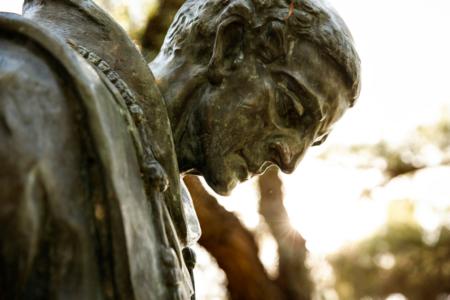On keeping soon-to-be-St. Junipero's statue in the Capitol
The Franciscan friar and missionary who established the first missions in California, Blessed Junipero Serra, is going to be canonized by Pope Francis during his visit to Washington, D.C., next month on Wednesday, Sept. 23. In deciding to canonize the founding father of California, Pope Francis has dispensed with the usual requirement of a miracle due to the intercession of the blessed-in-question, as he has done for other prominent missionaries like Peter Faber, one of the first Jesuits, and Marie of the Incarnation, the Ursuline nun who evangelized Canada.
This will be the first time a canonization of a saint has occurred in the United States, and it will also be the first time a Hispanic American has been canonized here. Pope Francis will celebrate the Mass of Canonization, reportedly in Spanish, outdoors in the field between the Basilica of the National Shrine of the Immaculate Conception and the Catholic University of America. As a native of Washington, D.C. who was present at the National Shrine both when St. John Paul II visited in 1979 and when Pope Benedict visited in 2008, I hope to be there for the historic occasion.
Why in Washington and not in California? Well, the pope's first visit is taking him only to cities in the East: to New York to address the United Nations, to Philadelphia for the World Meeting of Families, and to Washington, D.C. to address a joint session of Congress, among other events. The pope has also mentioned the fact that Blessed Junipero's statue is in statuary hall as one of the two statues representing California (The other is of Ronald Reagan.)
There has also been some controversy in California about the propriety of canonizing Junipero Serra. The concern among some Native Americans and others is that the colonization and conversion of the native peoples came at a heavy price: death for many of them because of the spread of disease brought by the Europeans, and a loss of their native culture and traditions. There has even been an attempt by some California legislators to remove Father Serra's statue from the U.S. Capitol.
California Governor Jerry Brown, however, told Catholic News Service last month that "We're going to keep his statue in Congress." In January, Brown said that "tragedy and good and evil often inhere in the same situation. And that doesn't mean we won't have our saints. It's just that we have to understand that saints, like everybody else, are not perfect."
Last week, in an op-ed in the New York Times, Lawrence Downes urges an examination of conscience on the occasion of Father Serra's canonization on the treatment of Indians by the European colonizers. He then quotes from testimony given in 1797 by Indians about their mistreatment. Of course, Junipero Serra died in 1784, so the testimony is not necessarily probative on the conditions at the missions during Father Serra's presidency.
In order to form a more balanced perspective on the merits of Blessed Juipero's sainthood, one would do well to read the documentation and articles assembled by the Archdiocese of Los Angeles at www.stjunipero.org, or the recent pamphlet written by Bill Donohue of the Catholic League of Religious and Civil Rights entitled "The Noble Legacy of Father Serra," available for download at www.catholicleague.org/wp-content/uploads/2015/06/Father-Serra-copy.pdf.
As Donahue says, "Serra, who never flogged anyone (save himself as an expression of redemptive suffering), admitted there were some excesses, but he also stressed something that is hard for 21st century Americans to understand: unlike flogging done by the authorities, when priests indulged the practice, it was done out of love, not hatred. 'We, every one of us, Serra said, 'came here for the single purpose of doing them (the Indians) good and for their eternal salvation, and I feel sure that everyone knows that we love them.'"
Donohue also notes that when Mission San Diego was attacked and burned, "and one of (Father Serra's) priest friends was killed,...he...didn't give in to vengeance. He wrote (the viceroy) imploring him not to execute the nine Indians who were being held in custody for the rebellion...He said, 'let (them) live so that (they) can be saved, for that is the purpose of our coming here and its sole justification.'" Would that Andrew Jackson, who adorns our $20 bill, yet enforced the genocidal Trail of Tears, or for that matter the largely Anglo Forty-Niners who flocked to California when gold was discovered at Sutter's Mill and now have a professional football team named after them, had been nearly as loving and merciful towards the native Americans they encountered.
DWIGHT G. DUNCAN IS A PROFESSOR OF CONSTITUTIONAL LAW AT UMASS SCHOOL OF LAW DARTMOUTH.
- Dwight G. Duncan is professor at UMass School of Law Dartmouth. He holds degrees in both civil and canon law.



















